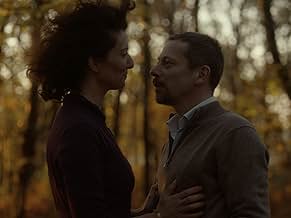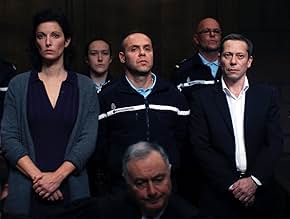VALUTAZIONE IMDb
6,3/10
3861
LA TUA VALUTAZIONE
Nella loro camera d'albergo blu, due amanti sposati pianificano un futuro impossibile, mentre la morte chiude la loro tranquillità già fragile.Nella loro camera d'albergo blu, due amanti sposati pianificano un futuro impossibile, mentre la morte chiude la loro tranquillità già fragile.Nella loro camera d'albergo blu, due amanti sposati pianificano un futuro impossibile, mentre la morte chiude la loro tranquillità già fragile.
- Regia
- Sceneggiatura
- Star
- Premi
- 1 vittoria e 5 candidature totali
Recensioni in evidenza
Slow moving (although only 76 minutes long), starting in the middle of confusion and sexual passion, and only very gradually revealing exactly what the central mystery being examined even is. All we know is that middle-class Julien (expertly played by director Amalric) and sexy, cold and intense Esther (the excellent Stephanie Cleau) have tremendous sexual chemistry, if not much real emotion between them. They are both married to other people, and we soon learn something awful has happened that has caused Julien to be under intense questioning by the police. All the other details are only revealed bit by bit as the story jumps around through a fractured time-scape.
Amalric uses the camera to underline and echo elements of the tricky construction, using odd, disquieting close ups that give us only a bit of the big picture, or pulling back to beautifully framed but distant feeling wider shots that give us the geography, but don't let us inside. The performances too – both by the leads and all the supporting characters – also serve the style. They're all dense and meticulously detailed, but it's up to us to figure out what those subtle details of behavior mean. Is that glance a look of love? Desire? Contempt? Does Julien's lawyer believe him? Does Julien's wife suspect or not?
If ultimately this adaptation of a Georges Simenon piece isn't quite as powerful as it's opening leads one to hope, it's still a smart, chilling and impressive directorial effort for Amalric.
Amalric uses the camera to underline and echo elements of the tricky construction, using odd, disquieting close ups that give us only a bit of the big picture, or pulling back to beautifully framed but distant feeling wider shots that give us the geography, but don't let us inside. The performances too – both by the leads and all the supporting characters – also serve the style. They're all dense and meticulously detailed, but it's up to us to figure out what those subtle details of behavior mean. Is that glance a look of love? Desire? Contempt? Does Julien's lawyer believe him? Does Julien's wife suspect or not?
If ultimately this adaptation of a Georges Simenon piece isn't quite as powerful as it's opening leads one to hope, it's still a smart, chilling and impressive directorial effort for Amalric.
about desire. about the role of the other. about flesh and love and hidden by yourself sins, about the search of yourself and about the fall of a night.about justice. a film who mix, in wise manner, the seduction with fascination. a work of beauty and dark secrets and images of victims and fragile intentions. it could be the film of Mathieu Amalric. like many of his films because he has the science and the gift to propose the right solution for the tone of story. because it is a film of details, about a not special event, in which the states of characters remains the only significant thing. so, a film who must see. for the acting first. then, for atmosphere.
not an ordinary adaptation. the spirit of many contemporary French films. Mathieu Amalric using same tools to build his character. a Simenon in different manner. a cold film about relationship and decisions, about guilty and events who has a strange touching manner to surprise the viewer not for evolution of events but for the attitudes of characters. a film of silence and guilty out of facts. because it preserves the Greek mark of destiny, the poetry of things, the emotions as a kind of fog. nothing clear, each detail as part of a sort of ambiguity and slow rhythm of events. a film with a specific target who could seems be boring for many. but useful with few drops of patience. and with a crumb of interest for Simenon universe.
Mathieu Amalric isn't one to shy away from a risky project—has anybody seen the film where he plays a shrink and Benicio Del Toro's a Blackfoot WWII vet with PTSD? Here he and his real-life partner, Stéphanie Cléau, co-star in a stripped-down 75' adaptation of a Simenon story of erotic obsession and justice gone awry. The fine performances and the film's time-shuffling structure help maintain a high level of suspense at least past the halfway mark, though it seems to me that Amalric and Cléau, who also wrote the script, might have thrown a little too much of Simenon's backstory out with the bathwater.
The plodding inquiry that begins even before we know a crime has been committed certainly explains Julien's (MA's character's) air of glum fatalism through the second half of the film, but the script's intense focus on the two lovers doesn't prepare us for the final courtroom scene, in which a character we've barely seen before steps into the spotlight. (I'm planning to watch again to test the hypothesis, suggested by some online reviewers, that the crime the protags are charged with was committed by someone else )
The courtroom scene has a nightmarish quality, like one of Hitchcock's "wrong man" films; the trial itself seems like an open-mic session where gossipy townsfolk step up to air their gripes about the defendants—one witness dismisses Julien's stylish modernist house as a "crappy little shack." There's certainly a disconnect between Simenon's view of blind, blundering justice and our own no doubt idealized police procedurals and courtroom dramas; I agree with other reviewers that Julien would have excellent grounds for appeal on the basis of blatant judicial bias and ineffective counsel.
The plodding inquiry that begins even before we know a crime has been committed certainly explains Julien's (MA's character's) air of glum fatalism through the second half of the film, but the script's intense focus on the two lovers doesn't prepare us for the final courtroom scene, in which a character we've barely seen before steps into the spotlight. (I'm planning to watch again to test the hypothesis, suggested by some online reviewers, that the crime the protags are charged with was committed by someone else )
The courtroom scene has a nightmarish quality, like one of Hitchcock's "wrong man" films; the trial itself seems like an open-mic session where gossipy townsfolk step up to air their gripes about the defendants—one witness dismisses Julien's stylish modernist house as a "crappy little shack." There's certainly a disconnect between Simenon's view of blind, blundering justice and our own no doubt idealized police procedurals and courtroom dramas; I agree with other reviewers that Julien would have excellent grounds for appeal on the basis of blatant judicial bias and ineffective counsel.
This is exactly the kind of movie which grows on you.Based on a Simenon book , the story could have descended towards the banalities of the love triangle , a situation we've been told so many times here there and everywhere.That the opening scene may be very hot does not help for that matter.
Mathieu Amalric is fully aware of this ;his film looks like a jig saw puzzle ,with a very smart construction . When his film begins ,the die is cast :it's a long questioning by policemen and judges ; all the tragedy is told little by little, with flashbacks and portraits of the characters alive of dead : Almaric does not even fall in the trap of sentimentality : this is amour fou,in the fullest sense of the term ,but the characters are not really endearing : Esther is a selfish unsympathetic attractive woman who "waits-deadpan- for her sick husband to die " and one cannot blame her mother-in-law 's petulant attitude .The same goes for her lover -not so handsome ,after all - who 's got everything going for him ,a loving wife -with whom the viewer has a tendency to side, mainly when he knows the truth ,a cute child ,a desirable dwelling -one of the envious men calls it a b......t house during the trial- and thriving business.
This looks like a news item : one has the odd feeling of discovering the affair day by day ,with new revelations ; and Amalric deserves a bouquet for sparing us a looooong trial with the de rigueur brilliant lawyer : in this context ,it would be totally irrelevant : amour fou can't be explained ,period.
Mathieu Amalric is fully aware of this ;his film looks like a jig saw puzzle ,with a very smart construction . When his film begins ,the die is cast :it's a long questioning by policemen and judges ; all the tragedy is told little by little, with flashbacks and portraits of the characters alive of dead : Almaric does not even fall in the trap of sentimentality : this is amour fou,in the fullest sense of the term ,but the characters are not really endearing : Esther is a selfish unsympathetic attractive woman who "waits-deadpan- for her sick husband to die " and one cannot blame her mother-in-law 's petulant attitude .The same goes for her lover -not so handsome ,after all - who 's got everything going for him ,a loving wife -with whom the viewer has a tendency to side, mainly when he knows the truth ,a cute child ,a desirable dwelling -one of the envious men calls it a b......t house during the trial- and thriving business.
This looks like a news item : one has the odd feeling of discovering the affair day by day ,with new revelations ; and Amalric deserves a bouquet for sparing us a looooong trial with the de rigueur brilliant lawyer : in this context ,it would be totally irrelevant : amour fou can't be explained ,period.
Lo sapevi?
- QuizFirst and, as of 2023, only film appearance for Mona Jaffart.
- ConnessioniReferences Pacific Rim (2013)
- Colonne sonoreChaconne - Partita for Violin No.2 (BWV 1004)
Written by Johann Sebastian Bach (as Bach)
Transcribed for piano by Ferruccio Busoni (as Busoni)
Performed by Itamar Golan
I più visti
Accedi per valutare e creare un elenco di titoli salvati per ottenere consigli personalizzati
- How long is The Blue Room?Powered by Alexa
Dettagli
- Data di uscita
- Paese di origine
- Siti ufficiali
- Lingua
- Celebre anche come
- The Blue Room
- Luoghi delle riprese
- Les Sables-d'Olonne, Vendée, Francia(vacations by the sea)
- Aziende produttrici
- Vedi altri crediti dell’azienda su IMDbPro
Botteghino
- Lordo Stati Uniti e Canada
- 254.666 USD
- Fine settimana di apertura Stati Uniti e Canada
- 21.809 USD
- 5 ott 2014
- Lordo in tutto il mondo
- 1.232.900 USD
- Tempo di esecuzione1 ora 16 minuti
- Colore
- Mix di suoni
- Proporzioni
- 1.33 : 1
Contribuisci a questa pagina
Suggerisci una modifica o aggiungi i contenuti mancanti

Divario superiore
What is the Brazilian Portuguese language plot outline for La camera azzurra (2014)?
Rispondi
























